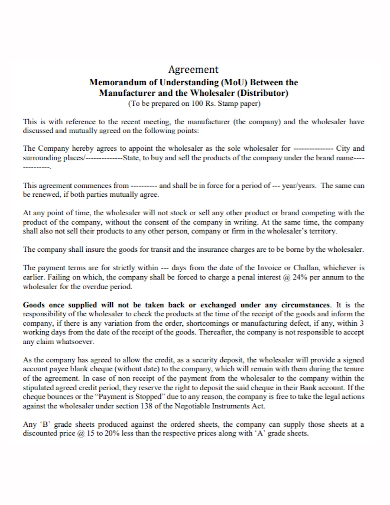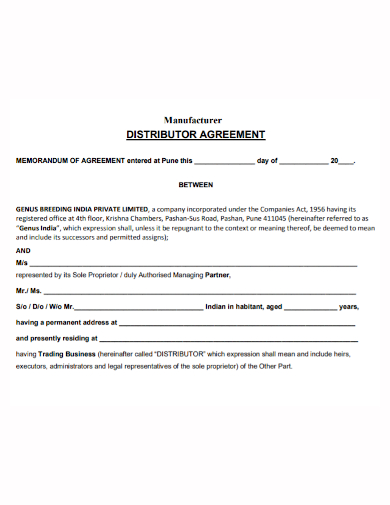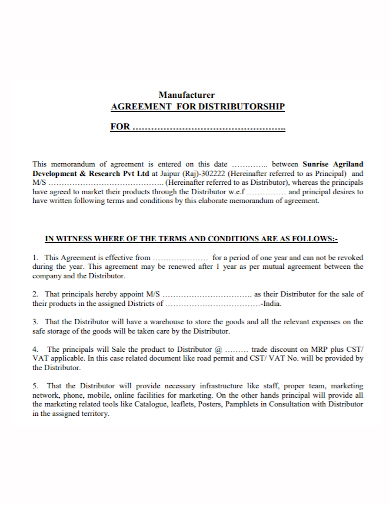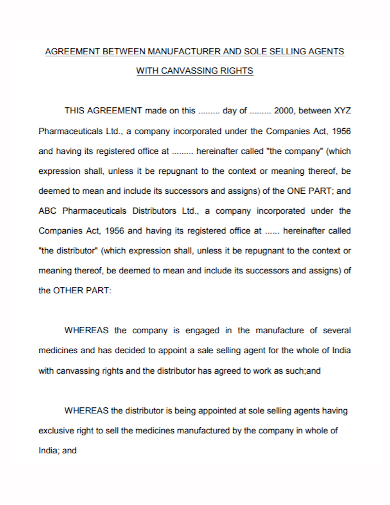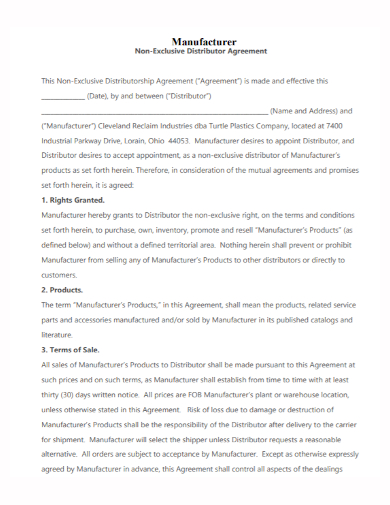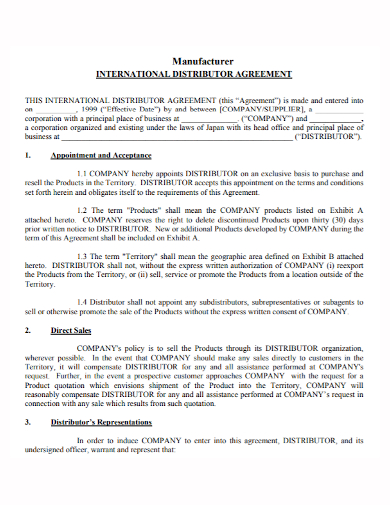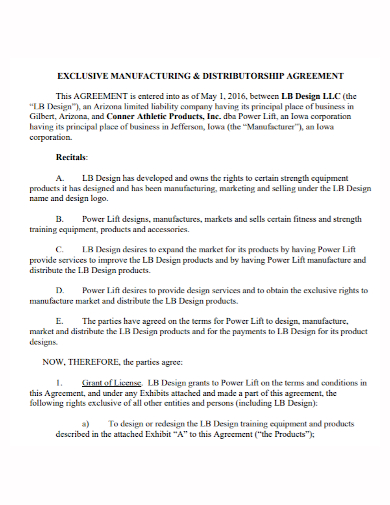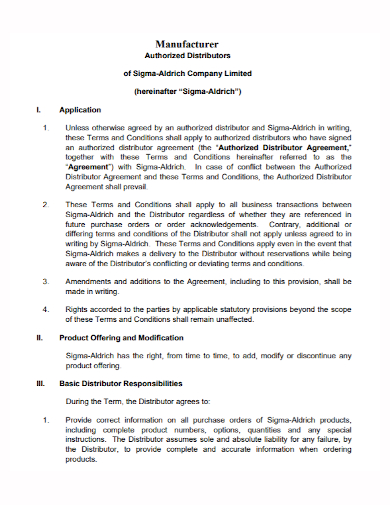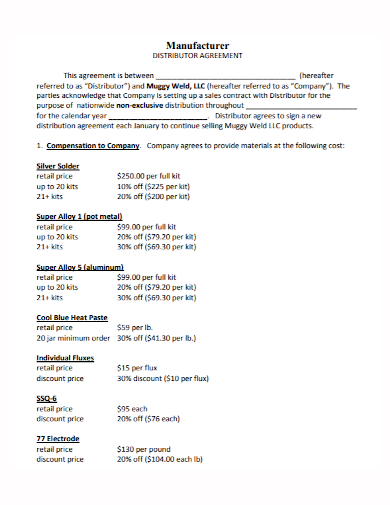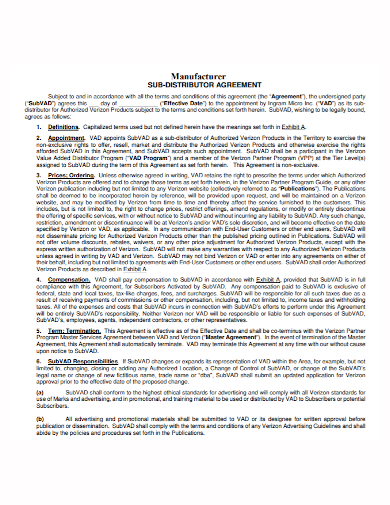Direct selling and distribution sales are the two main ways to get products to market in the industrial manufacturing world. While the direct selling model has many advantages, it also comes with several drawbacks, the majority of which stem from the complexity of supply chain management.
Distributors purchase inventory from manufacturers directly and resell it through their network of retail stores and/or e-commerce sites. By selling through distribution, manufacturers not only relieve some of their logistical and marketing burdens, but they also ensure that their products reach the right customers at the right time, thanks to the accessibility provided by a diverse network of distribution locations.
10+ Manufacturer Distributor Agreement Samples
A distributor purchases goods from a supplier stores them in a warehouse and then sells them to retailers or end-users. Depending on what they sell, distributors can be B2B or B2C. Distributors handle large companies’ raw material purchases, which can be complicated and time-consuming. This streamlines the purchasing process for large businesses by allowing them to obtain their goods from a single distributor. Certain products are usually kept in stock by distributors so that these types of businesses can get them quickly.
1. Manufacturer Distributor Agreement Template
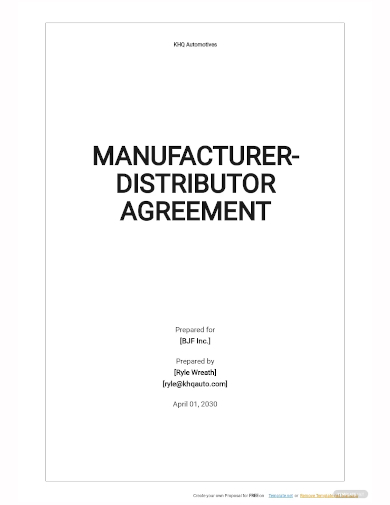
2. Manufacturer and Wholesale Distributor Agreement
3. Manufacturer Distributor Agreement
4. Manufacturer Distributorship Agreement
5. Manufacturer Agent Distributor Agreement
6. Manufacturer Non-Exclusive Distributor Agreement
7. Sample Manufacturer Distributor Agreement
8. Manufacturer and Distributor Agreement
9. Company Manufacturer Distributor Agreement
10. Manufacturer Compensation Distributor Agreement
11. Manufacturer Sub-Distributor Agreement
Manufacturer-Distributor Relationship
The manufacturer-distributor relationship is a symbiosis one by nature; without distributors, manufacturers would find it difficult with getting their products to customers, and without manufacturers, distributors really had nothing to sell. In theory, this appears to be a simple concept to grasp, but in practice, not all manufacturer-distributor relationships are so straightforward. Each entity has its own objectives and goals, and it is the responsibility of both parties to collaborate in order to understand each other’s needs and overcome any obstacles that may arise in their relationship. The ultimate goal is to transform a transactional relationship into one that is aligned and collaborative. This is a difficult task, and in this post, we’ll look at some options for carrying it out.
Common Challenges
Before we can talk about how to improve the manufacturer-distributor relationship, we need to understand some of the challenges that each party faces in their relationship, as well as where these individual challenges may overlap and misalign with the other party.
From a manufacturing standpoint, maintaining a brand’s integrity and consistency as its products are disseminated across a complex distribution network with numerous customer touch-points can be difficult. As a result, manufacturers must be able to provide indirect support to their distributors through marketing efforts such as promotional materials, digital engagement programs, and a steady flow of sales-qualified leads. Additionally, in order to consistently drive their bottom line, manufacturers must be able to engage with the right distributors, representatives, and customers at every stage of their supply chain.
Distributors, on the other hand, are self-contained companies whose internal objectives do not always coincide with those of their suppliers. Because distributors are primarily concerned with profit margins, they may be more inclined to sell an older, more familiar product rather than a newer product that the manufacturer wants to promote right now.
FAQs
What is a supplier?
A supplier is a business-to-business (B2B) entity that sells products and services directly from the manufacturer to customers. They can also be the manufacturer, providing raw materials such as lumber, steel, or oil. A flour milling company sells to a vendor, such as a bakery, who then sells to the final customer. A non-manufacturing supplier merely acts as a middleman, obtaining the product from the manufacturer and distributing it to other businesses.
What is a vendor?
A vendor is a business-to-consumer (B2C) company that sells goods and services to the end-user. A big-box retailer is an excellent example of a vendor. Big box stores sell a wide range of products to their customers, all of which are sold at final sale prices, which means the items will not be resold. Typically, manufacturers separate suppliers (who provide physical products) from vendors (who provide services and software), but vendors who provide services and software can also be considered a business-to-business (B2B) entity. Because they provide software and services but do not “supply” any physical goods to the company, companies can act as vendors to other businesses.
If you want to see more samples and formats, check out some manufacturer distributor agreement samples and templates provided in the article for your reference.
Related Posts
FREE 10+ Mentoring Agreement Samples In MS Word | Apple Pages | PDF
FREE 10+ Partner Agreement Samples In MS Word | Google Docs | Apple Pages | PDF
FREE 10+ Individual Agreement Samples In MS Word | Google Docs | Apple Pages | PDF
FREE 10+ Strategic Agreement Samples In MS Word | Google Docs | Apple Pages | PDF
FREE 10+ Equity Agreement Samples In MS Word | Google Docs | Apple Pages | PDF
FREE 10+ Producer Agreement Samples in MS Word | Apple Pages | PDF
FREE 10+ Grant Agreement Samples In MS Word | Apple Pages | PDF
FREE 8+ Meeting Agreement Samples in MS Word | Google Docs | Apple Pages | PDF
FREE 10+ Community Agreement Samples In MS Word | Google Docs | PDF
FREE 8+ Real Estate Option Agreement Samples in MS Word | PDF
FREE 10+ Call Option Agreement Samples In MS Word | PDF
FREE 10+ Advertising Agreement Samples In MS Word | Google Docs | Apple Pages | PDF
FREE 10+ Car Agreement Samples In MS Word | Google Docs | Apple Pages | PDF
FREE 10+ Horse Agreement Samples In MS Word | Apple Pages | PDF
FREE 10+ Option Agreement Samples In MS Word | Google Docs | Apple Pages | PDF

